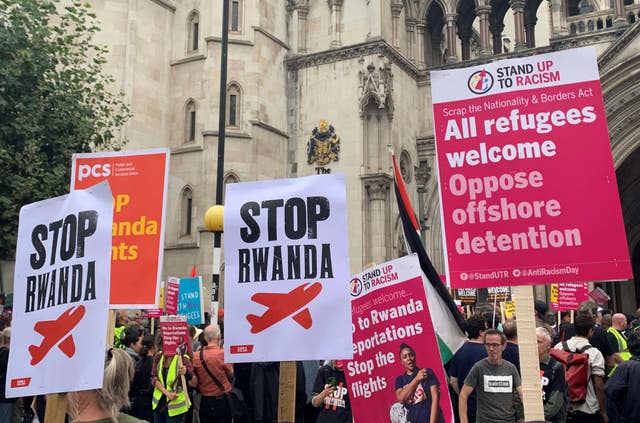Plans to deport asylum seekers to Rwanda are lawful, High Court rules
Two senior judges gave their decision in a ruling on Monday.

Government plans to deport asylum seekers to Rwanda are lawful, the High Court has ruled.
Several challenges were brought against the proposals announced by then-home secretary Priti Patel in April, which she described as a “world-first agreement” with the east African nation in a bid to deter migrants from crossing the Channel.
The first deportation flight – due to take off on June 14 – was then grounded amid a series of objections against individual removals and the policy as a whole.
However, at the High Court in London on Monday, senior judges rejected arguments that the plans to provide one-way tickets to the east African nation were unlawful.

Lord Justice Lewis, sitting with Mr Justice Swift, dismissed the challenges against the policy as a whole, but ruled in favour of eight asylum seekers, finding the government had acted wrongly in their individual cases.
In a summary of the ruling read out in court, Lord Justice Lewis said: “The court has concluded that it is lawful for the Government to make arrangements for relocating asylum seekers to Rwanda and for their asylum claims to be determined in Rwanda rather than in the United Kingdom.”
He added: “The relocation of asylum seekers to Rwanda is consistent with the Refugee Convention and with the statutory and other legal obligations on the Government, including the obligations imposed by the Human Rights Act 1998.”
However, he said that the Home Secretary “has not properly considered” the eight individuals’ cases, which meant the decisions to send them to Rwanda would be quashed and sent back to be reconsidered.
It is likely that Monday’s decision will be appealed against.
Lord Justice Lewis said a further hearing would take place in mid-January to handle the consequences of the judgment, including costs and applications to go to the Court of Appeal.
At a five-day hearing in September, lawyers for several asylum seekers – along with the Public and Commercial Services union (PCS) and charities Care4Calais and Detention Action – argued the plans are unlawful and that Rwanda “tortures and murders those it considers to be its opponents”.
UNHCR – the UN Refugee Agency – intervened in the case, telling the court that Rwanda “lacks irreducible minimum components of an accessible, reliable, fair and efficient asylum system” and that the policy would lead to a serious risk of breaches of the Refugee Convention.
At a further hearing in October, lawyers for the charity Asylum Aid also challenged the policy, arguing that the procedure is “seriously unfair” and also unlawful, with asylum seekers put at risk of being removed without access to legal advice.
The Home Office defended the claims, with lawyers arguing the memorandum of understanding agreed between the UK and Rwanda provides assurances that ensure everyone sent there will have a “safe and effective” refugee status determination procedure.
People deported to Rwanda will be provided with “adequate accommodation”, food, free medical assistance, education, language and professional development training and “integration programmes”, judges were told, as part of plans that have cost at least £120 million.
Rwandan government spokeswoman Yolande Makolo said: “We welcome this decision and stand ready to offer asylum seekers and migrants safety and the opportunity to build a new life in Rwanda.
“This is a positive step in our quest to contribute innovative, long-term solutions to the global migration crisis.”
Detention Action and Care4Calais both said they were disappointed with the ruling and were considering whether to appeal against the decision.
Deputy director of Detention Action James Wilson said: “However, we will fight on. The Rwanda policy is brutal and harmful.”
Care4Calais founder Clare Moseley said: “We remain steadfast in our opposition to the Rwanda policy and in our determination to ensure that no refugee is forcibly deported.”
Leigh Day solicitor Carolin Ott, who represents Asylum Aid, said the charity “remains seriously concerned that the curtailed process that has been adopted to forcibly remove asylum seekers from the UK means they will be denied effective access to legal advice and the court”.





